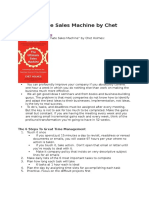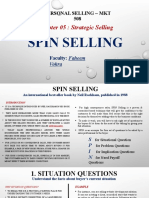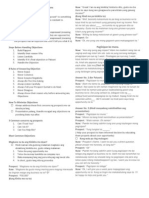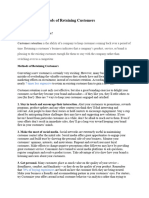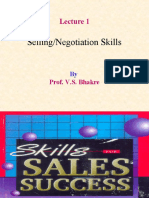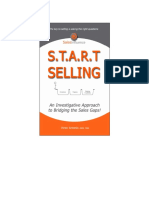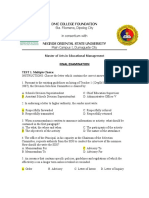OBJECTION-HANDLING
When a sales person demonstrates a feature, talks about a benefit or uses a sales closing technique, their customer may well respond in the negative sense, giving excuses or otherwise heading away from the sale. The response to this is to handle these objections. This is 'objection-handling'. Objection-handling techniques and methods Boomerang: Bouncing back what they give you. Objection Chunking: Taking a higher or lower viewpoint. Conditional Close: Make closure a condition for resolving their objection. Curiosity: Don't be sad, be curious. Deflection: Avoid responding to objection, just letting it pass. Feel, felt, found: A classic way of moving them. Humor: Respond with humor rather than frustration. Justification: Say how reasonable the objection is. LAARC: Listen, Acknowledge, Assess, Respond, Confirm. LAIR: Listen, Acknowledge, Identify objection, Reverse it. Objection Writing: Write down and cross out objections. Pre-empting: Handle them before they happen. Pushback: Object to their objection. Reframing: Change their cognitive frame. Renaming: Change the words to change the meaning. Reprioritize: So ones you can't handle are lower. Writing: Write down objections then cross them off as you handle them.
Objection Handling In Sales - Ask And All Shall Be Revealed! Faced with an objection? Always ask What do you mean by that? PROSPECT Its just too much money YOU What do you mean by that? PROSPECT I just havent got enough money left over from wages this month to fund this piece of kit? YOU What could you afford this month? PROSPECT About 100
�YOU And you could pay the remaining 60 next month? PROSPECT Oh yeah. No problem YOU Ok, lets do that then. You need to qualify what the objection really means.
Avoid Objections
So what's the secret to handling objections? The secret is to manage the sales process so as to avoid them. That's it. Now, how exactly does one do this? Well, first of all, remember that people buy from people they know, people they like, and people they trust. So build rapport, be likeable and be trustworthy. Do what you say you'll do when you said you'd do it. Secondly, listen to your customer's concerns. Find out what's standing in the way of his buying from you. What is he unsure or uncomfortable about? If you've spent the major part of the sales process asking questions, probing and qualifying the customer, you will probably have a good idea of what situations have to be solved or clarified before the customer will feel comfortable moving ahead. Sometimes there's no simple solution to the customer's concerns. That's when the customer will hesitate to move forward. If you can't find a solution, maybe you can negotiate a resolution. Perhaps a delayed delivery can be offset in some manner. Maybe no one's product will meet the customer's required specifications and your task is to help the customer accept your solution as the closest match he's likely to find.
Negotiate a Resolution
Whatever it is that's keeping the sales process from moving forward, it's your job to identify it and to address it in a professional, non-confrontational manner. You're not trying to overcome the objection; you're working with the customer to resolve the situation in a mutually beneficial manner. When you do this in a spirit of friendly cooperation, you're partnering with the customer and coming across as a problem solver, not a peddler. So, by treating what is often considered objections as simple requests for more information or clarification, you can reduce the stress of the situation and keep the sales process moving, hopefully to a successful conclusion. Should sales trainers stop teaching objection-handling techniques? No, but they should put more emphasis on how to avoid customer concerns from coming up in the first place. They should help salespeople recognize the difference between a valid customer concern and an emotional bias. Salespeople need to improve their skills at uncovering the customer's concerns early in the sales process. They also need to know the difference between a put-off and the reality of human nature that causes a customer to say, "I want to think about it."
�The final secret of handling objections is to listen. Most salespeople wouldn't listen at all if they didn't think it was their turn to talk next! You need to hone your skill at not just hearing what the customer is saying, but understanding what the customer is saying. Once you understand what is standing in the way, you can work with the customer to pave the way to a smooth sale. The key to handling objections isn't confrontation; it's cooperation. Things not to do when overcoming sales objections 1) Never but never argue. Even if you are right you'll probably lose the sale. 2) Never, but never attack the person. Separate the person from the objection and deal with it as apart from them. If you fight a person's feelings, more negative emotions will emerge and you will lose! (Not a good Rapport building tactic) 3 ) Never assume you understand an unspecified word When overcoming sales objections if a prospect uses a word that is aNominalisation.dont start answering until you first understand their meaning. ( Briefly, a nominalisation is a word you cannot place in a wheelbarrow, its a concept not a tangible thing.) For example, if a prospect says: I need versatility. Dont start talking about flexibility or the range of products you have or your payment options because that may not be what your client is talking about. Better to ask: 'Could you explain to me what you mean by versatility?' or 4 ) Never Insult the Prospect Lets look at an example.Prospect: 'Your prices are too high.' It would not be very smart to reply with, 'Arent you interested in quality?' You could reply with:High prices compared to what? or you could soften that with,I understand your concern about pricing, we all need to ensure were competitive in this modern world, and could you tell me who or what you are comparing us to in making that comparison? 5 ) Never Avoid the Issue 'Quite frankly, your service is useless.' It would not be right in overcoming sales objections to change the subject or talk in theory about what is good service because you are dealing with an emotion here. The client is obviously angry or frustrated when the use a word like useless. You need to help them vent their emotion. Much better to stick with the issue, 'Obviously something has happened to make you feel that way. Can you tell me about it?'
�You need to do your best to establish and maintain Rapport in these situations. 6 ) Dont Shift Responsibility When there is a problem dont try to blame it on your office staff or your delivery people. Think about how that is perceived by your customer. Your customer will only understand that you are dodging the blame. What your customer wants is for someone to accept responsibility and fix the problem. You need to be responding with We., to show that you stand with your company then with Ill fix it. The I bit is important as you are the company in the eyes of your customer and if you have any sort of relationship with him / her they will feel more comfortable knowing the person who is looking into it for them. 7) Never, but never make the person wrong. When overcoming sales objections never make a person wrong because you will create an enemy. Making the person wrong is not a good Rapport building strategy. 8 ) Never Contradict the Prospect Prospect: 'You guys always seem to be having production problems.' Mistake: 'No, that's not correct. We had some problems when we upgraded the plant two years ago. Did you know we have not had any downtime in the last 18 months?' A better reply would be: 'Yes, we had some production problems when we upgraded the plant and currently the plant is running flawlessly, in fact, its been running like that for the past 18 months. Can you tell me if you have experienced any delays so that I can investigate further?' In the second reply, the sales rep acknowledges the prospect's perception of a problem. Remember, first you meet them where they are and then move them to where you want them to be. 9 ) Dont dwell too long on an objection When overcoming sales objections dont dwell too long on an objection because you will amplify its importance in the mind of your customer. Better to answer briefly. Your answer should be just long enough to satisfy the prospect, and no longer. 10 ) Never guess an answer When overcoming sales objections don't guess at an answer. Admit you don't know. Say: "I'm sorry, I don't have the answer to that question, but I promise to get the information to you." When you actually get back to them with a reply, this will show you have the courage to admit what you dont know and that you walk your talk and follow through on your commitments. This can only improve the clients perception of you.










